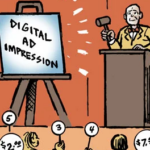 Facebook is being raked over the coals about measurement at Advertising Week in New York City.
Facebook is being raked over the coals about measurement at Advertising Week in New York City.
For the last two years, Facebook was only counting videos that were seen for three seconds or more, resulting in exaggerated reported average view times. The heat was so great that Carolyn Everson, Facebook’s VP for global marketing solutions, addressed it proactively in a Monday appearance.
But it’s not just egg on Facebook’s face.
At an IAB event on Tuesday, Jimmy Maymann, AOL’s EVP of content and consumer brands, declared that without transparency, “we risk having advertisers that don’t really believe in the metrics and the numbers we’re putting in front of them, and that’s obviously a setback for the entire industry.”
Although it’s hard to argue that there was anything malicious happening on Facebook’s end and Facebook has taken steps to rectify the situation, the fact that it happened at all – and for two years – is more ammunition for a buy side pushing walled gardens to institute further third-party measurement.
GroupM, for example, determined that the overestimation didn’t affect pricing or the audience delivery of its campaigns, but an impact on the bottom line isn’t the only point.
In a statement, GroupM, which has a history of throwing down the gauntlet when it comes to measurement, called the average view time error “careless and unfortunate” and noted that the situation underscores ”the importance and need for third-party verification for all media – not only to verify trading terms, but also to verify performance.”
Trust is a fragile thing, and once it’s been called into question, that question will always hang there, with advertisers left to wonder what other measurement-related skeletons are hanging out in the closet.
“The Facebook measurement misstep is nonmaterial financially, [but it] erodes our trust in Facebook’s own internal measures,” said Charlie Fiordalis, chief digital officer at indie media agency Media Storm. “We don’t trust Facebook to grade their own homework.”
It’s a walled-garden thing. Large consumer platforms like Facebook are guardians of troves of personally identifiable information, which means they’ve understandably got to tread lightly, said Tyler Pietz, VP of programmatic at Cadreon, IPG’s trading desk.
But walled gardens also “present a significant obstacle to advertisers’ need for consistent planning/buying methodology and the persistence of their ability to measure,” Pietz said. “[And] absent Facebook’s ability to address where they fall short or to redefine the standard in their favor, I think advertisers will remain understandably hesitant to move investment as aggressively into Facebook as they would otherwise.”
Third-party measurement isn’t completely foreign to Facebook. Roughly this time last year, Facebook partnered with Moat to independently measure its video ads, followed last April by additional partnerships with Integral Ad Science, comScore and Nielsen.
Moat, for one, was quick to point out that the metric miscalculation reported by Facebook was independent of Moat. “All Moat data and metrics, including average viewing time for video ads, are accurate,” stated Moat CEO Jonah Goodhart. “We applaud Facebook’s transparency in acknowledging this error.”
Regardless, Facebook will be under pressure to make some sort of big, splashy announcement, whether that’s around a new verified metric or extended partnerships, to appease its critics, which Eamon Boyle, chief intelligence officer at media agency Assembly, predicts will happen within the next 12 months.
“This is an industry where innovation is king, but if at some point people lose trust in something, even if it’s a huge company, it can lose the currency it’s gained,” Boyle said. “What is the true value of anything when there’s no transparency? That’s our big issue in general, and Facebook just contributes to it.”
But it’s too simplistic a narrative to say that advertisers have any intention of spending less on Facebook because of transparency issues – in fact, Facebook announced on Tuesday that it just hit 4 million active advertisers on its platform – or that the video metric blunder will cause an about face from Facebook in terms of letting down the garden walls.
The resolution is likely somewhere in the middle, with a little shimmying from both sides.
“I believe the old adage ‘money talks, BS walks’ very much applies here,” Pietz said. “Unsurprisingly, Facebook has shown its greatest willingness to adapt its ad product in favor of advertisers when it sees an opportunity to drive incremental value or perceives a credible threat to existing revenue. Advertisers will face their best chance of success if they can form a unified front, are specific and prescriptive in their ask and are willing to make their investment contingent on Facebook offering a viable solution.”
Video is a core component of Facebook’s strategy – in particular, mobile video – and it behooves Facebook to buoy confidence and keep that gravy train rolling.
Stepping back from the issue of advertisers looking for more third-party measurement, there’s a broader question to be asked around cross-platform digital measurement, the current state of which leaves a lot to be desired. TV may have its flaws, but it’s a proven storytelling channel, and advertisers are used to that.
“Everybody struggles with the storytelling part of it on digital, particularly with walled gardens when you don’t know where the crossover is between different audiences,” said Rob Griffin, chief innovation officer at indie digital agency Almighty. “For all of TV’s issues, you basically know what you’re getting. But measuring a brand story across digital – that’s far more complex that just bringing in the third parties.”














